Waterproofing basement walls
Moisture in the basement is harmful not just to the space, but to the entire home. Having moisture seeping through the walls of the basement, basement window wells, or other places can lead to a whole list of structural and health damage. It is crucial to address wet basement walls immediately. Although there are plentiful ways to keep moisture buildup away from the area, the best solution is to waterproof basement walls.
In this article, we will discuss in brief the various aspects of waterproofing, the signs that point to the presence of wet basement walls in a home and the different products that are good performers at keeping moisture away, etc. With that said, let us get started!
What are the signs of water damage in my basement walls?
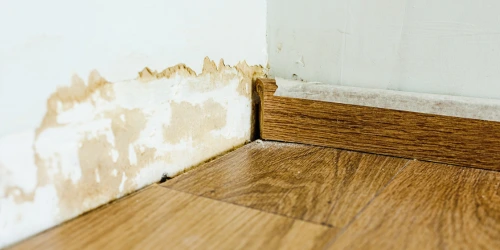
It is true that basement waterproofing cost is expensive. Despite the high basement waterproofing costs, it cannot be avoided. Protecting basement walls and concrete walls from moisture problems is crucial. Wet basement walls or moist basement walls are the root cost of plentiful moisture problems. The excess moisture and humidity levels in the basement can lead to moisture getting trapped in the basement walls. As the concrete walls absorb water and moisture from standing water or become subjected to further damage from water seepage through small cracks, you will be able to identify this water damage with various signs.
A leaky basement or a flooded basement can be identified by the following signs. it is inevitable that your crawl space or basement needs waterproofing if you notice any one of these signs. Get ready for a home improvement waterproofing project when you find these.
Musty odor or unpleasant smell
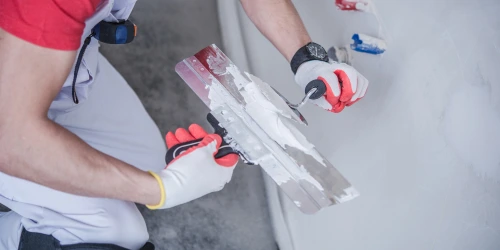
Moist walls have an unpleasant odor to them. Be it new walls, wet basement walls, or any exterior walls- waterproofing your basement walls is important when you can get a whiff of an unpleasant smell. You can consider using waterproofing paint or applying waterproof coating when you find that there is a moist or musty smell in a crawl space, basement, or anywhere in your home.
Stains
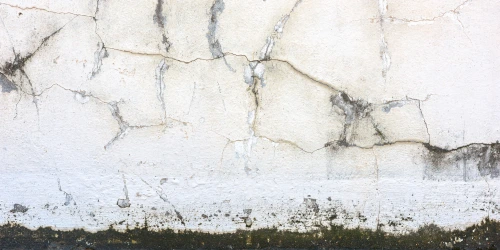
Another prominent sign of water pooling or damage is staining. If you had an episode of basement flooding or standing water, you can be sure that your basement walls and basement floors can be filled with water stains. Standing water in a flooded basement will cause stains on the basement floor and basement walls when it has not been removed. You cannot delay your waterproofing project if you find these stains. An effective waterproof paint over old paint with stains will serve useful.
Swollen doors
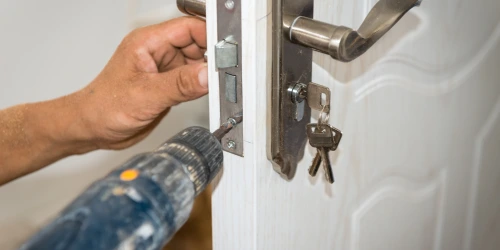
One of the common moisture problems in not just a basement or crawl space, but in any ither room of the house is swollen doors. When there is a fluctuation in the excess moisture content in the room, the reaction leads to the expansion and contraction of wood. If you experience difficulties in opening and closing the basement doors or a basement window or a door or window in any other room, you can be sure that it is time for waterproofing.
Visible cracks
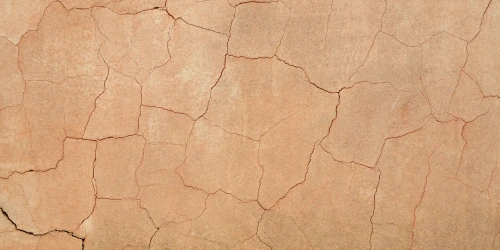
If there are visible cracks on your basement walls and basement floors you must turn to waterproofing paint. Invest time, effort, and money on a cost-effective home improvement waterproofing project to fill cracks. Be it large or small cracks, you must fill cracks as they can easily bring water into your home and cause the basement walls to absorb water.
Mold and mildew
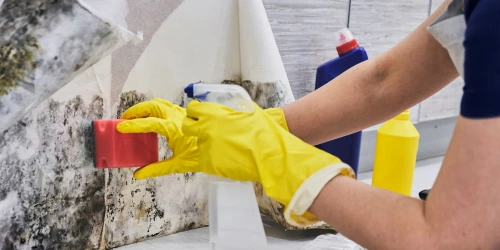
Yet another important sign that can tell you it is time to waterproof your basement is mold and mildew. Highly efficient basement waterproofing solutions will aim to remove all traces of mold and mildew. It is crucial to invest in an effective waterproof membrane to remove mold and mildew completely.
This sign is not just an indicator that it is time for your to waterproof your basement walls and floors, but it also calls for your attention to the moisture content in the air and space. One of the biggest moisture problems in a home is mold and mildew. Apart from moist basement walls, they lead to a wide array of health hazards as well. Most homeowners resort to waterproofing paint over the old paint (which might be a temporary solution) and to also thorough basement waterproofing solutions that will cover foundation repair and high-quality waterproof membranes to prevent mold and mildew from regrowing.
What are the benefits of waterproofing my basement walls?
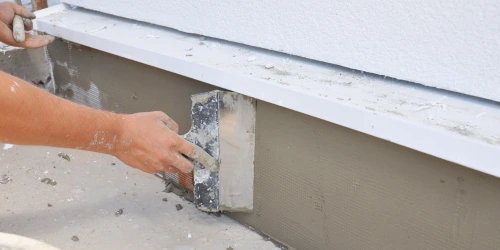
Most homeowners are confident that if they have basement waterproofing covered, they have a ton of other moisture and structural problems covered as well. When you apply waterproof coating to the basement walls, you can be assured that it will reap several benefits for your home.
➱ A leaky basement is no good. Water damage and standing water, or seepage via cracks will lead to a leaky basement. The mold that grows rapidly in less than 48 hours will wreak havoc in a damp basement. Protecting your health from allergies, mold fever, headaches, coughing, sneezing, asthma, and other respiratory issues can be done by waterproofing your basement walls and floors.
➱ Foundation repair is expensive, however, sometimes essential. By simply waterproofing your basement you will be able to enjoy the benefits of a stronger foundation. Unlike the full effects of foundation repair, with basement waterproofing, you can strengthen the foundation of your home. This will avert structural problems by keeping the basement walls and floors completely dry.
➱ Basement waterproofing is also a long-term solution to moisture damage. Any temporary solution will fail in a short while and lead to more moisture and structural problems. Whether your home experiences leaks from a drainage system, pipes, or other small cracks, it is better to invest in a basement waterproofing cost to keep the area completely dry and protected.
➱ It is a fact that most basements tend to become breeding grounds for mold and mildew due to the dark and favorable environment they make. keeping basements completely dry is possible by investing in dehumidifiers. However, during new home purchases, most homeowners prefer to have basement waterproofing covered. Rather than shell out basement waterproofing costs as a part of new home improvement projects, it is a boon if waterproofing basement walls and floors are already done.
What to use for waterproofing basement walls?
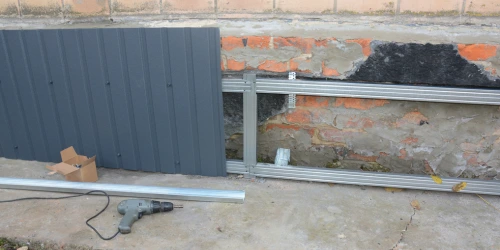
When you waterproof basement walls take all measures not to slack on the products that you use. There are several options to choose the right products for qualitative waterproofing.
- The right wall cleaner to remove efflorescence and mold can be used.
- Holes and cracks in the walls can be sealed with hydraulic cement.
- Window wells, windows, and doors can be resealed with silicone caulk or expanding foam.
- An extreme masonry waterproof coating is perfect to seal the areas thoroughly to prevent water infiltration.
How to clean basement walls before waterproofing?
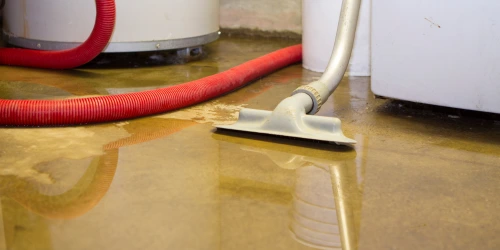
Before you begin to waterproof basement walls it is important to prepare the wall for the process. Cleaning the basement wall and getting it ready for waterproofing involves a few steps that cannot be missed.
Get rid of standing water
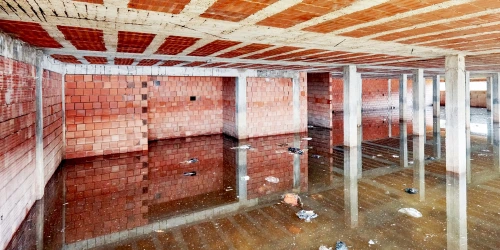
Extracting all standing water before you commence with the basement waterproofing is a crucial step. If you notice that there are any leaks coming from the basement, fix the issue. You have to ensure that the area is completely dry.
Clean and prepare
Keep the area free from dust, grime, and loose or broken masonry with a wire brush. Cleaning the area will improve the effectiveness of the process.
Remove efflorescence and mold
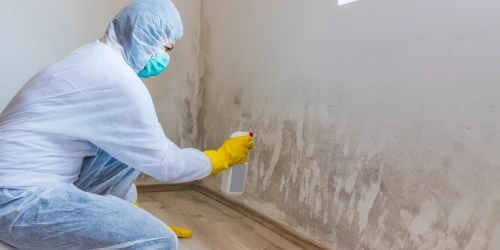
As the first part of cleaning, you must ensure the basement wall is free from mold and efflorescence. Water intrusion will push out water-soluble salt compounds in the masonry. These will cause white, powdery, crystal-like deposits on the surface. The salt residue will continue to remove after the water has evaporated. In other words, this is called efflorescence. You must remove efflorescence for effective adhesion of the waterproof paint.
The market is filled with choices to get rid of mold and efflorescence from basement walls. It is recommended to go for products that do not contain muriatic acid which makes storage difficult. Cleaning agents that are free from muriatic acid and do not become activated until combined with water are available. This will make storage safer and easier.
Old paint removal
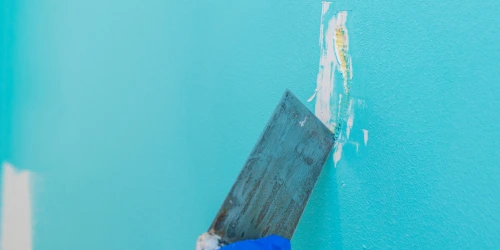
Make the best use of a wire brush, sandpaper, or chemical stripper to completely remove old paint. Before you apply the waterproof coating, the old paint and any other coating must be stripped down completely. Clean the walls thoroughly before you apply the new waterproof coating.
What is the difference between interior and exterior basement waterproofing?
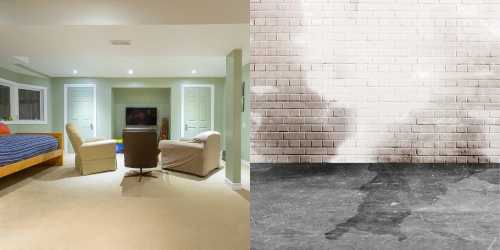
Interior basement waterproofing and exterior waterproofing is the two methods under basement waterproofing. Both interior waterproofing and exterior waterproofing are efficient methods. The big difference is that both techniques come with basement waterproofing costs.
With interior basement waterproofing you will be applying the sealant along the basement walls. On the contrary, with exterior waterproofing, you will have to dig below grade. This will expose your foundation and then coat it with a membrane.
Interior waterproofing is more cost-effective. Exterior waterproofing will require more time and labor and therefore the basement waterproofing costs for this will be expensive.
Can waterproofing basement walls increase the value of my home?

Yes, definitely. Basement waterproofing cost does not come cheap. Especially for interior waterproofing. Do not hesitate over the initial expenditure on basement waterproofing costs. Although they are high, it comes with a guarantee that good work done on basement waterproofing will have an impressive resale value.
The value of your home increases when you have invested in waterproofing your basement walls. Since basements tend to become moist easily, taking all measures to prevent wet basement walls, floors, and ceilings will work in your favor. A good home improvement project that waterproofs the basement, ensures proper working of the basement doors and windows, prevents chances of growing rotted wood, undertakes measures that concentrate on properly directing water, etc., will increase the value of your home.
FAQ Section
1. How long does basement waterproofing last?
Considering the high basement waterproofing cost you can be sure that waterproofing will last up to 10 years. Most reliable companies offer a decade-long warranty period when you waterproof basement walls. it helps to have a decade-long or similar warranty to get the best out of the investment.
2. How to waterproof cinder block basement wall?
Waterproofing cinder block basement walls is quite easy and doable when you follow the list of steps.
➱ Apply a barrier system as an effective layer of defense directly on a dry bare wall. This will function as the first line of defense on the cinder block.
➱ A permeable or breathable barrier is added to help the moisture that is already present to find a way out.
➱ You must also use a weather-resistant elastomeric layer. Using a suitable product will stick to the primed wall. This will create an impermeable barrier. The elastomeric layer will stretch and not tear even if the building is moved slightly.
➱ An important step that cannot be missed is to plug holes and fill even the smallest cracks. Good quality hydraulic cement can be used to plug holes and fill the cracks in the basement wall.
➱ Do not skip installing an air and moisture barrier.
➱ Most importantly, do not neglect the importance of a good drainage system.
3. How to waterproof basement wall cracks?
If you are looking for the best method to fix a seeping wall crack from the inside of a basement wall is by using the polyurethane injection process. Once any loose cement or aggregate has been removed, the basement waterproofing technician or expert will commence the process. Hydrostatic pressure and hydraulic cement can be put to good use here.
4. How much does it cost to waterproof basement walls?
Waterproofing basement walls is an expensive process. However, the cost of waterproofing basement walls can differ depending on the products used, the square foot of the area to the covered, the company undertaking the project, etc.
The national average to waterproof basement walls are placed at $4,920. However, the cost be anywhere from $2,300 to $7,575, depending on the factors aforementioned.
5. How do I choose the right waterproofing method for my basement walls?
Experts will always suggest that before you waterproof basement walls it is important to carry out a thorough analysis of the requirements. Foundation repair, interior waterproofing, exterior waterproofing, drainage system, and sealing are the different parts of the process. Each of these methods will have to be analyzed before the process initiates and the method of preference is selected depending on the requirements of your basement.
Wrapping Up
With this, we have reached the end of the article. We trust the article was able to draw a clear picture of the importance of keeping the basement dry and the products that will help you achieve perfect results. Contact the professionals to waterproof basement walls and keep your home protected.

About The Author
Charles Allen is an enthusiast of HVAC/indoor air. He has been fascinated by the way HVAC systems work since he was a child. He enjoys learning about new technologies and finding ways to improve the efficiency of HVAC systems. He is always looking for new ways to help people save money on their energy bills.